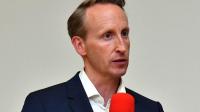CEO of Business Metropole Ruhr celebrates ongoing history

Rasmus C. Beck, CEO of Business Metropole Ruhr, tells Sebastian Shehadi about the region’s continued industrial prowess and competitive demographics.
Q: What makes the Ruhr region exciting in terms foreign investment opportunities?
A: Firstly, the Ruhr area is the industrial heart of Europe. It used to be the heart of the coal industry and the steel industry. We had massive structural change from old economies to new knowledge- and science-based industries. We have completed this transformation very successfully. Nowadays, we are a region with five million people, which is very dense, consisting of 53 cities, making it very interesting for foreign investors and companies.
Q: Are there certain cities or sectors that have some untapped and interesting opportunities you’d like to highlight?
A: There is one specific thing about our region, that there still is an industrial core. About 20% of all the employment is still in the heavy industry. This industry has changed a lot, as it is now knowledge-based. This makes value chains very industrial based in our region. The other sectors are more or less resource efficiency, logistics and healthcare. All these sectors are strongly related to industry in our region.
Q: Compared with other regions in Germany, what is another unique selling point?
A: There are no other regions with five million inhabitants. Berlin is 3.5 million. In our region you can travel from one city to another without realising it. I think this is a strong competitive advantage over other cities like Stuttgart and Frankfurt.
Q: How are you making your region more attractive for foreign investment?
A: We have 300,000 students in 22 universities in our region. On the other hand, for foreign investors we have developed a good system of economic development agencies that make the market very transparent. You need transparency to know which sectors are in which parts of the region. It is interesting to know where one can find networking partners, housing offers or sites to develop one’s business.
Q: In terms of Brexit, have you seen any positive impact on the Ruhr region?
A:On the one hand, the industrial sector exported a lot of goods to the UK and they are concerned about the future of these trade relationships. On the other hand, we also have noticed that a lot of English companies are thinking about coming to Europe and our region and looking a new home.
Q: Are there any concerns with regards to US tariffs on certain EU industries?
A: I think nowadays the whole investment climate is positive. We are not concerned about President Trump or anything else. There is a very strong regional market in Europe. In terms of investment for example, a lot of Israeli and Arabic investors come here to buy and sell housing. But of course in the long run, we care about our trade relationships with the US and we hope that they will be as good as they were in the past.
Q: Do you have anything to add?
[Our investment agency] has build up a platform with all the information about current developments within the Ruhr region, including real estate projects and other investments. The platform acts as a one-stop-shop providing investors with all the current information and contact details they need to invest in the Ruhr region. We think that digitalisation is changing our business model so we have kept up with the times. We have tried to be proactive to survive as a modern client-oriented economic agency, providing all this information for free to investors.

Global greenfield investment trends
Crossborder investment monitor
|
|
fDi Markets is the only online database tracking crossborder greenfield investment covering all sectors and countries worldwide. It provides real-time monitoring of investment projects, capital investment and job creation with powerful tools to track and profile companies investing overseas.
Corporate location benchmarking tool
fDi Benchmark is the only online tool to benchmark the competitiveness of countries and cities in over 50 sectors. Its comprehensive location data series covers the main cost and quality competitiveness indicators for over 300 locations around the world.
Research report
fDi Intelligence provides customised reports and data research which deliver vital business intelligence to corporations, investment promotion agencies, economic development organisations, consulting firms and research institutions.
Find out more.




